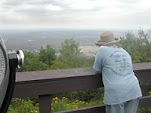The other day I was taking a walk on the lakeshore path at
lunch when I saw a notice that there was live music at a garden on campus. I
went to the garden and walked around, enjoying the sounds of the performer
singing and playing guitar. A couple of days ago I went back to the garden
again, and it was much quieter there, but there was a “Wish Tree” sign that
encouraged passersby to make a wish and hang it on the tree. They were oddly
specific about this wish, too – it wasn’t for just anything, but for spending a
month in a foreign country, and why you would choose that one. You were
supposed to write this wish on one of those paper wristbands you get at
waterparks and festivals to show that you paid, and then you were supposed to
put the “wristband” around a branch of the larch tree. I wrote that I would
like to spend a month in Ireland to practice using the language. It really was
an impractical language to study, considering that everyone who speaks it is
bilingual in English, but it is certainly a fascinating one structurally. I
would even go so far as to say it is weirder than Basque, if not altogether different
in the way that the subject of the sentence is sometimes (always in Basque) the
recipient of the action rather than the agent of it, or what we would call in
English the passive voice. It does make you stop and think why your own native
language is set up the way it is when you encounter one so different, an experience
I never really had with Romance languages – their big difference seems to be
having the adjectives after the noun instead of before it. I think the single
weirdest thing about Gaelic is the way the first sound of the word can change
depending on the part of speech or gender or, for verbs, whether it is a negative
or question form. Even Basque is not that weird.
Famous Hat


No comments:
Post a Comment